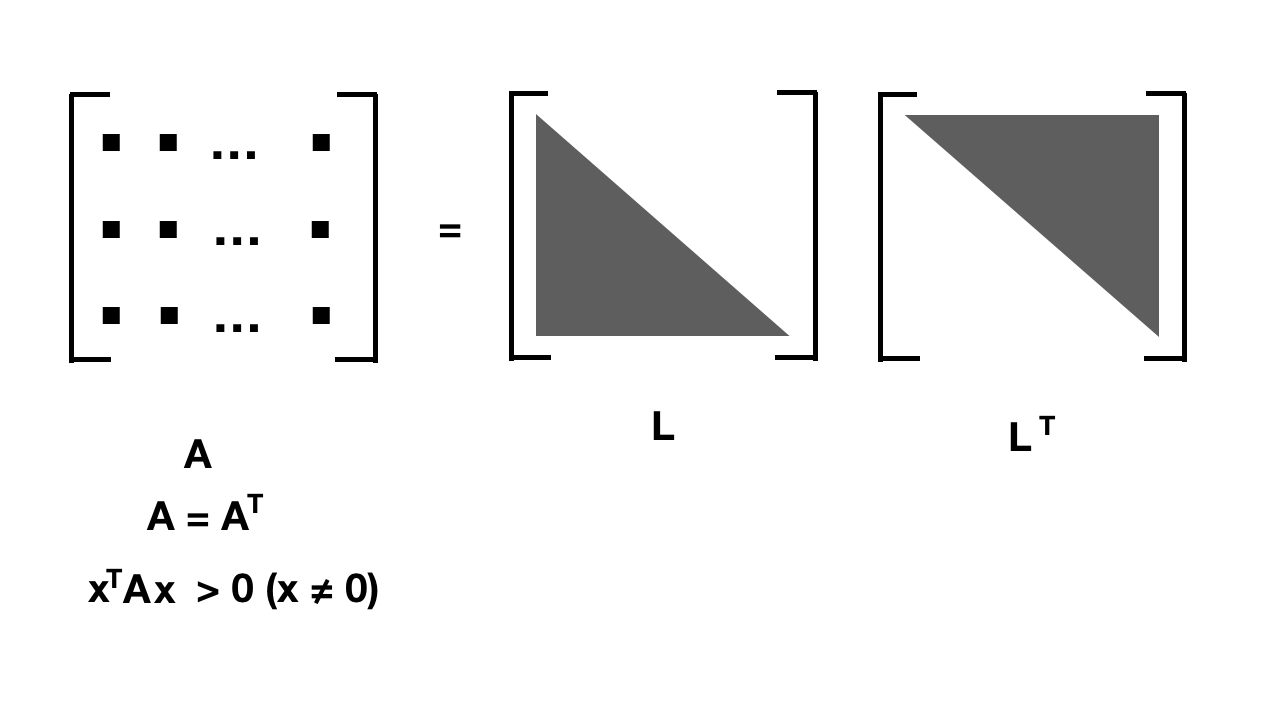Chapter 2 Cholesky分解 {Cholesky decomposition}
Cholesky 应该怎么念,o(╯□╰)o,听别人念比较像‘瞅乐死骑’,毕竟这是🇫🇷名字,哈哈哈哈
2.1 \(A^{T}A\)
这个矩阵非常重要,之前在最小二乘法也见过它,如果:
\[A\mathbf{x} = \mathbf{b}\]
无解,也就是 \(x= A^{-1}\mathbf{b}\) 不成立, A 不可逆,我们无法计算 \(A^{-1}\).
那么我们会想要最小化:
\[||A\mathbf{x} - \mathbf{b} ||_2\]
也就是:
\[\begin{align*} || A\mathbf{x} - \mathbf{b} ||^2 {} &= (A\mathbf{x} - \mathbf{b})\cdot(A\mathbf{x} - \mathbf{b}) \\ &= (A\mathbf{x} - \mathbf{b})^T \cdot (A\mathbf{x} - \mathbf{b}) \\ &= (\mathbf{x}^TA^T - \mathbf{b}^T) \cdot (A\mathbf{x} - \mathbf{b})\\ &= (\mathbf{x}^TA^TA\mathbf{x} - 2\mathbf{b}^TA\mathbf{x} + \mathbf{b}^T\mathbf{b}) \end{align*}\]
这个 Error 函数对 \(\mathbf{x}\) 求导:
\[ \frac{\partial E}{\partial \mathbf{x}} = 2A^TA\mathbf{x} - 2 A^T \mathbf{b}= 0 \]
也就是需要解:
\[ A^TA\mathbf{x} = A^T \mathbf{b} \tag{1} \]
(1)详细推导过程可以参见:least_squares_SP
(1)式也就是:
\[ \mathbf{x} = (A^TA)^{-1} A^T \mathbf{b} \tag{2} \]
(1)式 一定可以推出 (2) 式么? \((A^TA)^{-1}\) 一定存在逆矩阵么?也许不一定,不一定的原因是比如 A 不是方阵,那么 \(A^TA\) 就可能只是半正定,所以逆矩阵不存在,所以才有Tikhonov regularization
2.2 对称
对称,首先 \(A^TA\) 是对称阵,记得 \((AB)^T = B^TA^T\):
\[(A^TA)^T = A^T (A^T)^T = A^TA\]
它的转置等于自身,所以对称。
2.3 正定矩阵
先看定义:
\[ {\displaystyle M{\text{为正定矩阵}}\quad \iff \quad x^{\textsf {T}}Mx>0{\text{ for all }}x\in \mathbb {R} ^{n}\setminus \mathbf {0} } \]
\[ {\displaystyle M{\text{为半正定矩阵}}\quad \iff \quad x^{\textsf {T}}Mx \ge 0{\text{ for all }}x\in \mathbb {R} ^{n}} \]
这里的 A 我们暂时只考虑它是实数矩阵内,如果A是满秩的方阵,那么 \(A^TA\) 为正定矩阵:
\[x^TA^TAx = (Ax)^T \cdot Ax = ||Ax||^2\]
对于实正定矩阵,我们可以有Cholesky分解。
2.4 Cholesky分解
当 A 是一个SPD (real Symmetric positive definite matrix)的时候,注意这里的A 不是上面的 A(只是我用了同一个字母),就可以分解成 lower triangle 矩阵 L 和它的转置也就是 upper triangle \(L^T\).

可以用归纳法证明这个分解是一定存在并且是唯一的,可以参见:
How to prove the existence and uniqueness of Cholesky decomposition?
之前的高斯消元法中我们写过:
\[ A = PLU \]
当A正定的时候:
\[ A = LL^T \]
在实际中,如果矩阵是正定的,使用 Cholesky分解 会比 LU分解 更加高效,更加数值稳定。
2.5 计算
\[ \begin{aligned} \left({\begin{array}{*{3}{r}}4&12&-16\\12&37&-43\\-16&-43&98\\\end{array}}\right)=\left({\begin{array}{*{3}{r}}2&0&0\\6&1&0\\-8&5&3\\\end{array}}\right)\left({\begin{array}{*{3}{r}}2&6&-8\\0&1&5\\0&0&3\\\end{array}}\right) \end{aligned} \]
计算的话,我们可以用 scipy.linalg.cholesky